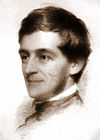Representative Men
Essays by Ralph Waldo Emerson

Representative Men is a collection of seven lectures by Ralph Waldo Emerson, published as a book of essays in 1850. The first essay discusses the role played by "great men" in society, and the remaining six each extol the virtues of one of six men deemed by Emerson to be great:
- Plato ("the Philosopher")
- Emanuel Swedenborg ("the Mystic")
- Michel de Montaigne ("the Skeptic")
- William Shakespeare ("the Poet")
- Napoleon ("the Man of the World")
- Johann Wolfgang von Goethe ("the Writer")
See also
- On Heroes, Hero-Worship, & the Heroic in History – a similar series of lectures given by Thomas Carlyle, Emerson's Scottish contemporary
- Parallel Lives – classic work by Ancient Greek biographer Plutarch, outlining the lives of elite individuals and the virtues they represented.
External links
Representative Men at Wikipedia's sister projects
 Media from Commons
Media from Commons Quotations from Wikiquote
Quotations from Wikiquote Texts from Wikisource
Texts from Wikisource Data from Wikidata
Data from Wikidata
 Representative Men public domain audiobook at LibriVox
Representative Men public domain audiobook at LibriVox
- v
- t
- e
Ralph Waldo Emerson
- "The American Scholar" (1837)
- "Divinity School Address" (1838)
- "New England Reformers" (1844)

- "The Rhodora" (1834)
- "Concord Hymn" (1836)
- "Uriel" (1846)
- "Brahma" (1856)
- "Boston Hymn" (1863)
- "Nature" (1836)
- "Self-Reliance" (1841)
- "Compensation" (1841)
- "The Over-Soul" (1841)
- "Circles" (1841)
- "The Poet" (1844)
- "Experience" (1844)
- "Politics" (1844)
- Essays: First Series (1841)
- Essays: Second Series (1844)
- Representative Men (1850)
- The Conduct of Life (1860)
 | This article about a philosophy-related book is a stub. You can help Wikipedia by expanding it. |
- v
- t
- e















